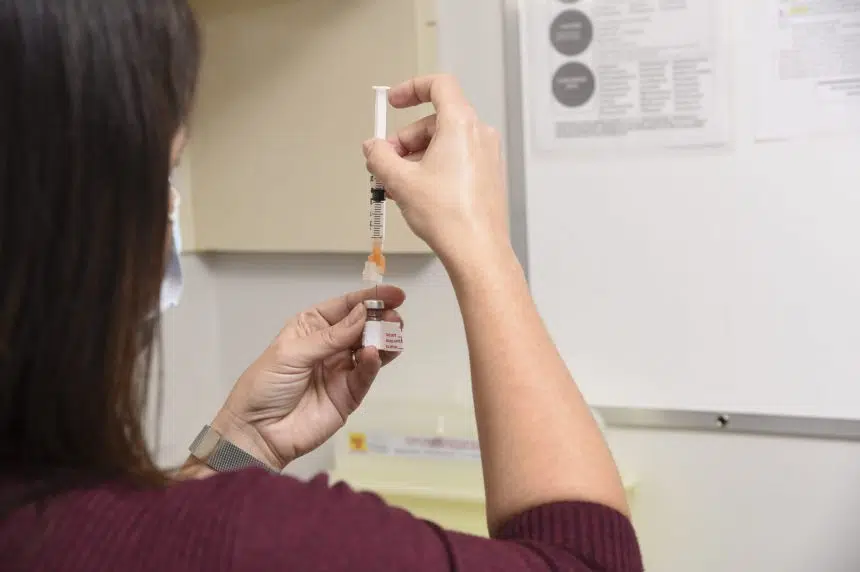The Government of Saskatchewan is lowering the age of eligibility for COVID-19 booster shots to 18.
Starting Monday, everyone 18 and over can book an appointment to get a booster shot, provided three months have passed since their second dose.
The move comes nine days after the age was lowered to 50 and over, with a five-month interval from a person’s second shot.
“(The vaccine) is likely the most effective thing we can do in preparing for Omicron to be present in our communities, which it most assuredly will be in the weeks and months ahead,” Premier Scott Moe said during a media conference Thursday at the Legislative Building.
According to the provincial government, 38 per cent of eligible Saskatchewan residents have received boosters to date, with more than 159,649 shots given.
Moe said vaccines are available at 241 locations in 140 communities, so people across the province can make appointments to get their first, second or third shots.
The premier said lowering the duration between second shots and boosters from five months to three months was based largely on what has been seen with the spread of the Omicron variant around the world.
“Our shortening of that time frame is essentially to ensure that there are more people eligible in a shorter period of time so that we can have more people in this province that ultimately do have their booster dose as it is proving to be effective against this variant that is arriving in Canada and most certainly we should assume is in our communities today as well,” Moe said.
He noted there currently are 400,000 doses of COVID vaccines available in the province and the federal government has given Saskatchewan assurances that more doses will be available as required.
The same applies to rapid tests. Saskatchewan residents are being urged to pick up free rapid test kits where they’re available.
More than eight million have been distributed in Saskatchewan to date, with another four million on the way.
“Testing is much more accessible in this province but it’s also normalized — and it needs to be more normalized in the weeks and months ahead,” Moe said.
“It is a very effective line of defence that we ultimately have. It’s a line of defence that is effective at slowing the spread of all COVID variants, in particular the Omicron variant that we are facing today and will be facing in the weeks ahead.”
The goal, Moe said, is to limit community transmission of the most transmissible COVID variant detected yet. The premier said Omicron is in Saskatchewan and residents should assume every new case is the new variant.
“At this point and time, it’s incumbent on all of us to do what we can to slow and stop the spread to the greatest degree possible in our communities,” he said.
“Let’s just be cautious in what we do for a while. I’m not saying that we can’t go out and do what we normally do. Let’s just have an extra layer of caution in doing just that.”
That said, Moe noted his government wasn’t looking at implementing more restrictions to keep the spread of the virus in check. They will be discussed, but it currently will be up to residents to exercise caution.
The government also said Saskatchewan residents who plan to travel should follow local public health orders and testing procedures upon arrival and departure.
However, Moe’s government won’t be stopping anyone from travelling.
“At this point in time, there’s no provincial recommendations against international travel,” Moe said. “We feel strongly that we have some of the most robust protocols available in any country or anyplace in the world when it comes to not only international travel but also interprovincial travel.”
Moe said a call involving the premiers and Prime Minister Justin Trudeau on Tuesday was “very much an informative call,” but there wasn’t consensus on travel restrictions because each premiers’ position differed slightly.
Asked if he agreed with the Trudeau government’s recent advisory against international travel, Moe replied: “I do enough judgment or reflection on federal government decisions.”
“This is a time for us to come together across this nation,” he added. “We have a challenge in front of us yet again. After 21 months of facing various variants of COVID, we likely have the most significant challenge ahead of us in Omicron as it looks to be many times more transmissible than anything we’ve faced thus far.”











